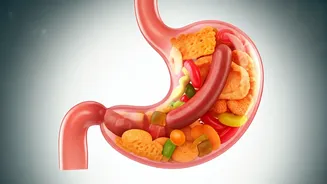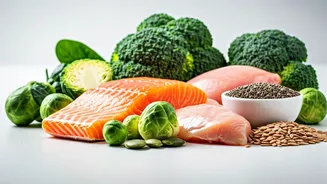Trans Fats
Trans fats, created through a process called hydrogenation to solidify liquid oils, are a major concern. They're often found in fried foods, baked goods,
and some margarines. The problem with trans fats is that they raise LDL (bad) cholesterol levels and lower HDL (good) cholesterol levels, increasing the risk of heart disease, stroke, and type 2 diabetes. The World Health Organization recommends limiting trans fat intake to less than 1% of total energy intake. Reading food labels carefully and choosing products that are trans fat-free is essential. Look for 'partially hydrogenated oil' on ingredient lists and avoid those products.
Excess Sodium
Processed foods are notorious for their high sodium content, which acts as a preservative and flavor enhancer. Consuming too much sodium can lead to high blood pressure, increasing the risk of heart disease, stroke, and kidney problems. Many packaged foods, such as processed meats, canned soups, and ready-to-eat meals, are loaded with sodium. The Dietary Guidelines for Americans recommend that adults consume no more than 2,300 milligrams of sodium per day. To reduce sodium intake, it's wise to read food labels, choose low-sodium options, and cook more meals at home. Try using herbs and spices to add flavor instead of salt.
Added Sugars
Added sugars, often hidden in processed foods and drinks, contribute to numerous health problems. They provide empty calories, meaning they offer little nutritional value while contributing to weight gain and increasing the risk of type 2 diabetes, heart disease, and fatty liver disease. Common sources of added sugars include sugary drinks, candies, and processed snacks. The American Heart Association recommends that women consume no more than 25 grams of added sugar per day and men no more than 36 grams. Always check nutrition labels for added sugars under names like high-fructose corn syrup, sucrose, and dextrose. Opting for water, unsweetened beverages, and whole foods can help manage your sugar intake effectively.
Artificial Sweeteners
While artificial sweeteners are used to reduce sugar and calorie intake, their long-term health effects are still being studied. Some studies suggest that certain artificial sweeteners may disrupt the gut microbiome, which can affect overall health. Common artificial sweeteners include aspartame, sucralose, and saccharin, often found in diet sodas, sugar-free snacks, and other products marketed as low-calorie. It is important to read labels and be aware that products labeled 'sugar-free' may still contain artificial sweeteners. Moderation and being mindful of your body's response to these sweeteners are essential. Choosing natural sweeteners like stevia or monk fruit may be a healthier alternative.
Artificial Colors
Artificial food colors are added to enhance the appearance of processed foods, but they have raised concerns regarding potential health risks. Some studies suggest that certain artificial colors may be associated with hyperactivity in children and allergic reactions in sensitive individuals. Common artificial colors like Yellow 5, Red 40, and Blue 1 are used in candies, snacks, and beverages. Regulatory bodies worldwide have approved these additives, but consumer awareness is growing. Reading ingredient lists and choosing foods with natural colorings from sources like fruits and vegetables is a good practice. Always be mindful of any adverse reactions after consuming foods with artificial colors and consider more natural alternatives.












